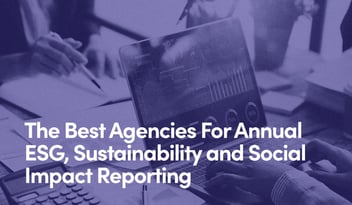How to Leverage Your ESG & Social Impact Reporting for Brand Visibility
You’ve probably noticed how some of your competitors have become increasingly public about societal issues. For instance, they’re inviting consumers to recycle packaging after use, highlighting how they sustainably source their ingredients, or signaling their support for gender equality initiatives.
Organizations are increasingly acknowledging their impact—both positive and negative—and it’s clear that consumers and investors are more attentive to the social and environmental impact brands have on the world.
In fact, 22% of investors hold a “zero tolerance” policy toward companies that exhibit unethical practices, while 55% of consumers want companies to take stands on environmental, social, and political issues, according to a 2019 study by AFLAC.
In response to this market shift, ESG (Environmental, Social, and Governance) and social impact reporting, which commonly serves as a non-financial reporting mechanism, can help companies strengthen their brands, attract investors, and engage consumers.
Why ESG and Social Impact Reporting Matters to Branding
Non-financial reporting is becoming increasingly important for companies looking to build a strong brand and reputation. Referring to the disclosure of a company's performance on environmental, social, and governance issues, ESG reporting includes such topics as energy efficiency, employee diversity, and executive compensation.
While ESG can best be understood as quantitative reporting driven by regulatory requirements for large and multinational enterprises, social impact reporting is generally more voluntary in nature and better suited for small and medium-sized businesses. Either way, both are incredibly additive for any brand.
This type of non-financial reporting matters for branding in three words: Reputation, responsibility, differentiation.
Fosters an Ethical Reputation
ESG and social impact reporting help to build your company's reputation for sustainability and responsible corporate behavior. They signal your concern for the impact you have on the wider world, beyond the bottom line.
Consumers and investors increasingly demand that companies demonstrate their commitment to environmental and social issues, and non-financial reporting provides a way for your company to do so transparently and comprehensively.
By demonstrating positive ESG or social impact performance, your company can attract not only customers and investors who prioritize sustainability and making a social impact, but you further ensure the integrity of your brand. You reduce the chances of being lampooned for lacking political or social urgency. Put simply you demonstrate your brand’s focus on ethical behavior. Of course, transparency is key. Organizations should not use ESG or social impact reporting as a cover for harmful societal impacts, as is the case with greenwashing.
Enhances a Sense of Responsibility & Accountability
ESG and social impact reporting enhance your company's sense of responsibility and accountability. It gives employees and stakeholders a mission to anchor operations and brand narratives around.
By measuring and reporting on your environmental and social impact, your company can identify areas for improvement and set targets for future performance, such as reducing waste or carbon emissions, hiring teams or boards with more diverse backgrounds, or increasing philanthropic efforts in local communities.
Non-financial reporting can also drive positive change within the company and demonstrate your commitment to continuous improvement. ESG and social impact reporting can be used to reinforce your mission and values across your organization.
If you’re willing to invest time and resources into evaluating your environmental, social, and governance impact, then there’s a good chance employees will be more committed to change initiatives.
These reports are also effective tools management can employ to minimize financial and legal risks and improve operational inefficiencies.
Differentiates From Competitors
ESG and social impact reporting ensure your company stands out among competitors. They communicate to customers and other stakeholders why working with you differs from businesses interested primarily in the bottom line. Non-financial reporting is a way to trumpet your intentions of being a good steward of your community or broader society.
There’s also a clear business case for non-financial reporting. Consumers are eager to reward socially conscious brands with their loyalty. According to an Ernst & Young survey, 58 percent of businesses that put an onus on “purpose” experienced at least 10 percent growth over a three-year period. Savvy investors realize this, as well.
For many consumers, it’s important for them to support companies that they’re aligned with socially. ESG and social impact reporting make it easier for them to decide whether your brand is worth their hard-earned money.
As customers look to purchase goods and services and investors seek out collaborators, non-financial reporting becomes a point of comparison for purchasing decisions and identifying risk.
A non-financial report reveals the positive social and environmental change you make when customers and stakeholders choose to give your company their money and attention. And, it gives them peace of mind when they know you’re making real-world impacts beyond dollars and aren’t going to be a reputational risk, unlike some of your competitors.
The bottom line: non-financial reporting builds trust.
Ways You Can Leverage ESG and Social Impact Reports for Brand Visibility
More and more companies employ ESG and social impact reports to communicate their commitment to sustainability, transparency, and responsible corporate behavior.
In fact, more than 90 percent of Fortune 500 companies and roughly 70 percent of Russell 1000 companies publish ESG or social impact reports, according to global consulting firm McKinsey.
With the growing number of businesses embracing non-financial reporting, here are a few more ways you can leverage them to amplify brand visibility:
- Highlight positive performance. You can use ESG and social impact reports to highlight your positive environmental, social, and governance performance. You can do this across social media and other marketing channels, including messaging on product packaging. This can include information on energy efficiency, waste reduction, employee diversity and inclusion, and responsible sourcing of materials.
By highlighting your company’s positive performance, you can position your brand as a leader in sustainability and attract consumers who prioritize such environmental efforts. - Generate content and marketing collateral. Non-financial reporting is rich with visuals, stories, and data that consumers and investors find compelling and resonant. Sprinkle details from these reports all across your marketing channels and communications. These seeds will grow over time and accumulate, each pointing back to your company’s commitment to sustainability and social responsibility.
These can be in the form of blog posts, infographics, email campaigns, or other social media efforts. Consider videos, seminars, or speaker series, as well, centering these initiatives in your marketing strategy.
Importantly, if your ESG and social impact reporting doesn’t get visibility, its value is dramatically diminished. - Engage with stakeholders. These reports can be used as a tool to engage with stakeholders, such as investors, customers, and employees. By sharing information about your sustainability goals and progress, your company can reflect your commitment to important social and political issues by inviting feedback and collaboration from stakeholders.
For instance, getting productive input on which initiatives to prioritize channels the democratic spirit inherent in ESG and social impact reporting. - Align with industry standards. ESG and social impact reports can be used to determine how well your company aligns with industry standards and best practices.
By following widely recognized sustainability reporting frameworks, such as the Global Reporting Initiative (GRI) or the Sustainability Accounting Standards Board (SASB), you can show that you are committed to transparency and accountability, and are measuring and reporting on key sustainability issues in a consistent and comparable way. - Attract top talent. Consumers aren’t the only ones concerned with the impact your business has on the world. The best and brightest professionals want to work for companies that are mission-driven and value-aligned, as well.
According to a recent study by global professional services firm Mercer, “top employers, as measured by employee satisfaction and attractiveness to talent, have significantly higher ESG scores than their peers. This pattern is partly due to these employers’ relatively strong environmental performance, though the trend is also evident across specific social and governance issues.”
Essentially, your ESG performance can improve employee satisfaction and attract the attention of talented prospective employees. By forefronting your non-financial reporting, you can bring in and retain some of the top talent in your industry.
Ultimately, by implementing ESG and social impact reporting into your business strategy, you can reduce legal and financial risks, attract top talent, overcome operational deficiencies, resonate with value-driven consumers, and set your brand apart from other competitors.
Your company will perform better, and you’ll be leaving a positive impact on the world around you.
Today's consumers and investors demand more transparency from the business community. We support organizations by developing a compelling narrative that clarifies your message, amplifies your mission, and empowers customers, investors, and talent to better engage with your brand. Learn more about our non-financial impact reporting capabilities.



